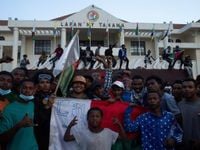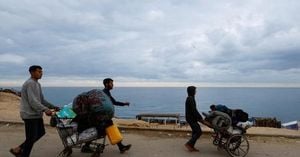Madagascar stands at a precarious crossroads after an elite military unit, CAPSAT, declared control over the nation’s armed forces, escalating a crisis that has been brewing for weeks in the streets of Antananarivo. The announcement, made on October 12, 2025, marks the most serious challenge to President Andry Rajoelina’s rule since he first rose to power more than a decade ago. The move comes in the wake of widespread, youth-led protests that have rocked the island nation since late September, with demonstrators demanding radical change and accountability from a government they accuse of corruption, mismanagement, and violent repression.
It all began on September 25, 2025, when young protesters, inspired by similar Gen Z movements in Kenya, Nepal, and beyond, took to the streets to decry chronic water and electricity shortages. But what started as frustration over basic services quickly snowballed into a full-scale uprising. According to APA and AFP, the demonstrators’ demands have grown to encompass calls for President Rajoelina’s resignation, the dismantling of the Senate, an end to privileges for business elites close to the regime, and deep reforms to combat corruption and nepotism. The protesters, organizing under the banner of “Gen Z Madagascar,” have become a force to be reckoned with—both online and in the public squares.
On October 11, the crisis reached a boiling point. CAPSAT soldiers, who once helped install Rajoelina during the 2009 coup, left their barracks in Soanierana and marched to May 13 Square, a site steeped in Madagascar’s history of political upheaval. Their arrival was met with cheers from protesters, many of whom had clashed with police and gendarmes earlier in the week. The symbolism was impossible to miss: an elite military unit, once the backbone of Rajoelina’s power, now siding with the people against him.
In a dramatic video statement released the following day, CAPSAT officers declared, “From now on, all orders of the Malagasy army – whether land, air or [naval] – will originate from CAPSAT headquarters.” They named General Demosthene Pikulas as the new chief of staff, filling a role left vacant after the previous occupant was appointed minister of the armed forces. CAPSAT condemned the use of force against civilians and urged fellow soldiers to disobey orders to fire on protesters. Colonel Michael Randrianirina, addressing the crowd from an armored vehicle, told the assembled masses, “Do we call this a coup? I don’t know yet.”
The presidency responded swiftly, warning of “an attempted illegal and forcible seizure of power” and calling for unity and dialogue. In a statement, President Rajoelina’s office declared, “In view of the extreme gravity of this situation, the President of the Republic … strongly condemns this attempt at destabilization and calls upon all forces of the nation to unite in defence of constitutional order and national sovereignty.” The government stressed that Rajoelina remains in the country and continues to manage national affairs. Prime Minister Ruphin Fortunat Zafisambo, newly appointed after the previous government was dissolved in a bid to appease public anger, appeared on state television to say the administration was “fully ready to listen and engage in dialogue with all factions – youth, unions or the military.”
But the protesters were unimpressed by the government’s overtures. In a statement on their website, Gen Z Madagascar retorted, “We do not reach out to a regime that every day crushes those who stand up for justice. This government talks about dialogue but rules with weapons.” Their movement, marked by the pirate skull and crossbones logo from the Japanese comic series One Piece—adapted with a traditional Malagasy hat—has become a rallying point for youth frustrated by years of stagnation. Their goals are sweeping: “radical change to build a free, egalitarian and united society,” transparency, accountability, and an end to “16 years of inaction.”
The unrest has come at a steep cost. According to the United Nations, at least 22 people have been killed and more than 100 injured since the protests began. Madagascar, home to over 31 million people, remains one of the world’s poorest countries, with 80 percent of the population affected by severe poverty. The current crisis is just the latest in a long history of political instability since the country gained independence from France in 1960. Several leaders have been forced out by uprisings, and the specter of another forced transition now looms large.
Observers note that Madagascar’s Gen Z protesters are part of a broader global trend. From Bangladesh to Morocco, young people are leveraging social media platforms like TikTok and Discord to organize, spread their message, and draw inspiration from each other. In recent months, youth-led protests have toppled leaders in Nepal and Bangladesh, fueling hope among Madagascar’s demonstrators that they too can bring about change. As Al Jazeera reports, “Across the world, Gen Z, or people below 30, are leading a new wave of protests. Unlike traditional movements, these demonstrations are often organised online, using platforms like TikTok and Discord to spread messages, plan actions and connect with other young people.”
The government, for its part, insists that it is still in control. The army’s chief of staff, General Jocelyn Rakotoson, urged citizens to “assist the security forces in restoring order through dialogue,” but there has been no confirmation from other military units regarding CAPSAT’s claim to authority. The situation remains fluid, and uncertainty hangs over the capital. Will other branches of the military fall in line behind CAPSAT, or will they remain loyal to Rajoelina? For now, no clear answer has emerged.
President Rajoelina’s own path to power is a reminder of the volatility that has long characterized Madagascar’s politics. He first rose to prominence as the mayor of Antananarivo, leading protests that culminated in the 2009 military-backed overthrow of President Marc Ravalomanana. A military council handed power to Rajoelina as transitional leader, and he later won presidential elections in 2018 and 2023, the latter marred by an opposition boycott. Now, the same military unit that once helped him to the top is threatening to unseat him.
As the world watches, the stakes could hardly be higher for Madagascar. The Gen Z protesters have shown no signs of backing down, and CAPSAT’s bold move has upended the balance of power. With more than 22 lives already lost and the country’s future in the balance, the coming days are likely to be decisive. For many Malagasy, the hope is for a peaceful resolution and a new beginning—one that finally addresses the deep inequalities and grievances that have brought so many into the streets.
In the meantime, Antananarivo remains tense, its fate hanging on the choices of soldiers, politicians, and a generation determined to make its voice heard.




